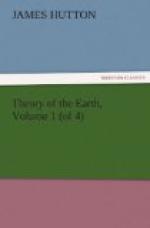But this is not all; for, even supposing their theory to be well founded and just, it is plainly contradicted by natural appearances. According to that theory of aqueous consolidation, all the stratified bodies, of which this earth in general consists, should be found in the natural order of their regular formation; but, instead of this, they are found every where disturbed in that order more or less; in many places this order and regularity is so disturbed as hardly to be acknowledged; in most places we find those stratified bodies broken, dislocated, and contorted, and this aqueous theory of mineralists has neither the means for attaining that end, were it required in their theory, nor have they any such purpose in their theory, were that end attainable by the means which they employ. Thus blinded by the prejudice of a false analogy, they do not even endeavour to gratify the human understanding (which naturally goes in quest of wisdom and design) by forming a hypothetical or specious theory of the mineral system; and they only amuse themselves with the supposition of an unknown operation of water for the explanation of their cabinet specimens, a supposition altogether ineffectual for the purpose of forming a habitable earth, and a supposition which is certainly contradicted by every natural appearance.
Thus, in examining geological and mineralogical theories, I am laid under the disagreeable necessity of pointing out the errors of physical principles which are assumed, the prejudices of theoretical opinions which have been received, and the misconceived notions which philosophers entertain with regard to the system of nature, in which may be perceived no ineffectual operation, nor any destructive intention, but the wise and benevolent purpose of preserving the present order of this world. But, though thus misled with regard to the cause of things, naturalists are every where making interesting observations in the mineral kingdom, I shall therefore avail myself of that instructive information, for the confirmation of my theory.
It may now be proper to consider what must be required, in order to have a geological and mineral theory established upon scientific principles, or on such grounds as must give conviction to those who will examine the subject; for, unless we may clearly see that there are means for attaining that desirable end, few philosophers will be persuaded to pursue this branch of knowledge.
A theory is nothing but the generalization of particular facts; and, in a theory of the earth, those facts must be taken from the observations of natural history. Nature is considered as absolutely true; no error or contradiction can be found in nature. For, if such contradiction were truly found, if the stone, for example, which fell to day were to rise again to-morrow, there would be an end of natural philosophy, our principles would fail, and we would no longer investigate the rules of nature from our observations.




